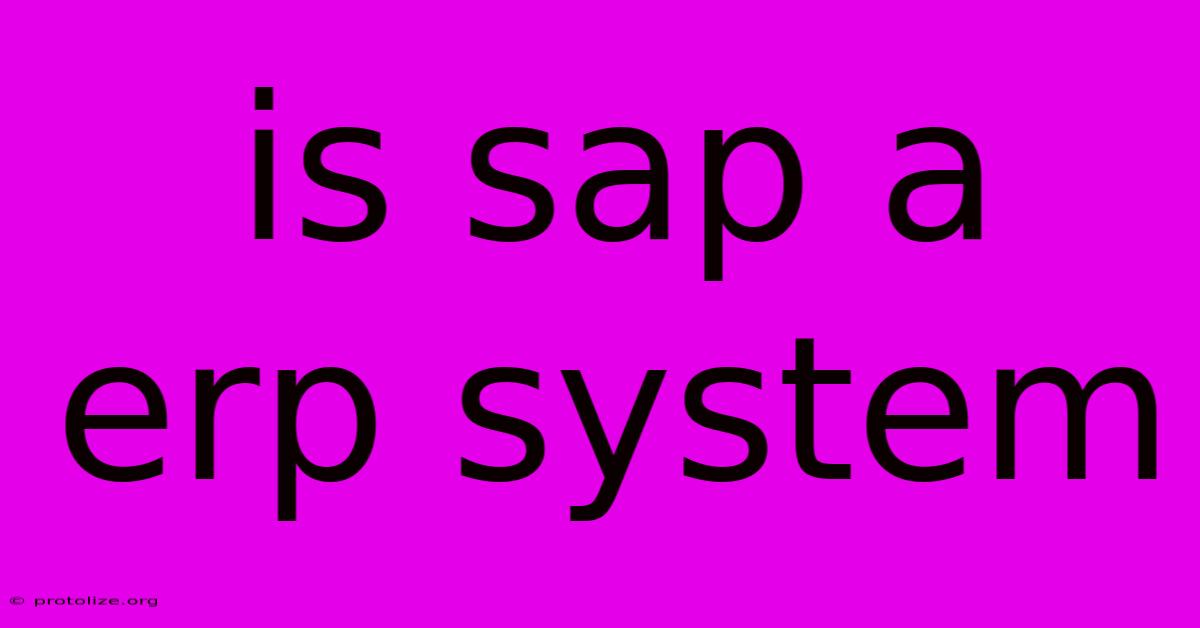Is Sap A Erp System

Discover more detailed and exciting information on our website. Click the link below to start your adventure: Visit Best Website mr.cleine.com. Don't miss out!
Table of Contents
Is SAP an ERP System? A Comprehensive Guide
Yes, SAP is an Enterprise Resource Planning (ERP) system. In fact, it's one of the most prominent and widely used ERP systems globally. But understanding what that truly means requires a deeper dive into what SAP offers and how it fits into the broader landscape of business management software. This article will explore SAP's role as an ERP, its key features, and its relevance in today's business environment.
Understanding Enterprise Resource Planning (ERP)
Before we delve into SAP specifically, let's define what an ERP system is. An ERP system integrates all facets of a business, including:
- Planning: From production scheduling to sales forecasting, ERP systems help businesses plan efficiently.
- Purchasing: Managing supplier relationships, inventory levels, and procurement processes.
- Manufacturing: Streamlining production, optimizing resource allocation, and ensuring quality control.
- Sales: Managing customer relationships, orders, and deliveries.
- Finance: Handling accounting, financial reporting, and budgeting.
- Human Resources: Managing employee information, payroll, and benefits.
Essentially, an ERP system acts as a central nervous system for a company, connecting all its disparate departments and providing a unified view of operations. This integration fosters efficiency, reduces redundancy, and improves decision-making.
SAP: The Leading ERP Solution
SAP's core offering is its SAP S/4HANA suite. This is a comprehensive ERP system built on the in-memory database platform, HANA. This platform offers significant advantages in terms of speed, scalability, and analytical capabilities. While S/4HANA is the flagship, SAP also provides a range of other solutions catering to specific industry needs and business sizes. This includes:
- SAP Business One: Designed for small and medium-sized enterprises (SMEs).
- SAP Business ByDesign: A cloud-based ERP solution for mid-sized businesses.
- Industry-specific solutions: SAP offers specialized ERP solutions tailored to industries like retail, manufacturing, and healthcare.
These different solutions all share a common thread: they provide integrated management of core business processes, firmly establishing SAP as a leading ERP provider.
Key Features of SAP as an ERP System:
- Real-time data processing: SAP's use of in-memory technology allows for immediate data access, leading to quicker decision-making.
- Integration: Seamlessly integrates various business functions, eliminating data silos.
- Scalability: Can adapt to the growth and changing needs of businesses of all sizes.
- Customization: Offers flexibility to tailor the system to specific business requirements.
- Advanced analytics: Provides powerful tools for data analysis and reporting.
- Mobile accessibility: Enables users to access critical information and functionalities on the go.
Why Businesses Choose SAP
The decision to implement an ERP system like SAP is significant. Here's why businesses choose SAP:
- Improved efficiency: Streamlined processes and automated workflows save time and resources.
- Reduced costs: Eliminates redundancies and improves resource allocation.
- Enhanced decision-making: Provides a clear and accurate picture of business operations.
- Better collaboration: Improves communication and information sharing across departments.
- Increased profitability: Drives efficiency and cost savings, ultimately leading to greater profitability.
- Competitive advantage: Provides businesses with the tools they need to stay ahead of the competition.
Beyond the ERP: SAP's Expanding Ecosystem
While SAP is best known for its ERP solutions, its offerings extend far beyond that. SAP also provides solutions in areas such as:
- Customer Relationship Management (CRM): Managing customer interactions and data.
- Supply Chain Management (SCM): Optimizing the flow of goods and services.
- Human Capital Management (HCM): Managing the entire employee lifecycle.
- Business Intelligence (BI): Transforming data into actionable insights.
This expansive ecosystem allows businesses to create a fully integrated digital enterprise, managed through a single, powerful platform.
Conclusion: SAP – More Than Just an ERP
In conclusion, yes, SAP is an ERP system, and a very powerful one at that. Its comprehensive suite of solutions, coupled with its robust platform and industry-leading capabilities, makes it a top choice for organizations seeking to optimize their business processes and gain a competitive edge. The breadth of its offerings extends far beyond the core ERP functionalities, offering a complete digital transformation solution for businesses of all sizes. Understanding the nuances of SAP's various offerings is crucial for any organization considering its implementation.

Thank you for visiting our website wich cover about Is Sap A Erp System. We hope the information provided has been useful to you. Feel free to contact us if you have any questions or need further assistance. See you next time and dont miss to bookmark.
Featured Posts
-
Erp In Care
Dec 13, 2024
-
Types Of Erp
Dec 13, 2024
-
Liberal Party Pesuttos Strong Stand
Dec 13, 2024
-
Trump Person Of The Year Again
Dec 13, 2024
-
Erp Meaning
Dec 13, 2024
